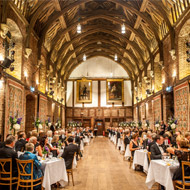
Alumni invited back to attend programme of events
Past alumni gathered at the RVC over the weekend (15-16 October) to celebrate the College’s 225th birthday.
The RVC is the oldest veterinary school in the English-speaking world, and the creation of the College in 1791 marked the establishment of the veterinary profession in Britain.
Starting out as a horse infirmary with a handful of students, the RVC has become a world-class science-based institution, producing internationally renowned veterinarians and scientists.
To mark 225 years and celebrate the heritage of veterinary and scientific education, the RVC invited alumni back to attend a programme of events. These included a gala dinner on Saturday and an open day and campus tour on Sunday.
On Sunday, activities focused on the history of RVC with displays, talks and a film screening. Guests also took part in a ethical debate that related to the balance between business and welfare in all aspects of veterinary work.
“It is a great honour to lead the RVC, which has achieved so much over the centuries, within this era of so many exciting breakthroughs,” said RVC Principal Stuart Reid.
“The College has always looked beyond the horizon to make advancements in science and practice, for the benefit of patients and communities globally, yet it is crucial to also recognise the essential contributions of those who have gone before.”
Professor Reid added: “As we celebrate 225 years as a world-leading institution, we honour all who have worked and studied here through the centuries. Our current advances in knowledge are built on the efforts of all who have been part of the RVC through the centuries.”
Image (C) RVC



 The latest
The latest